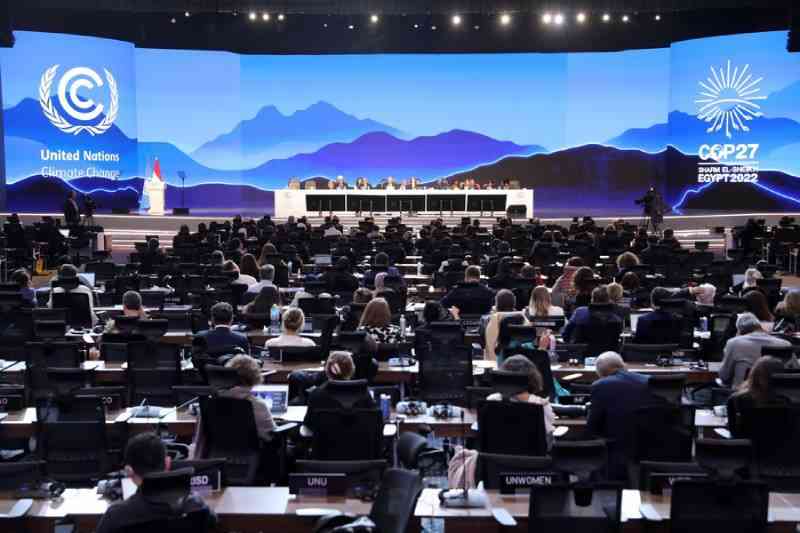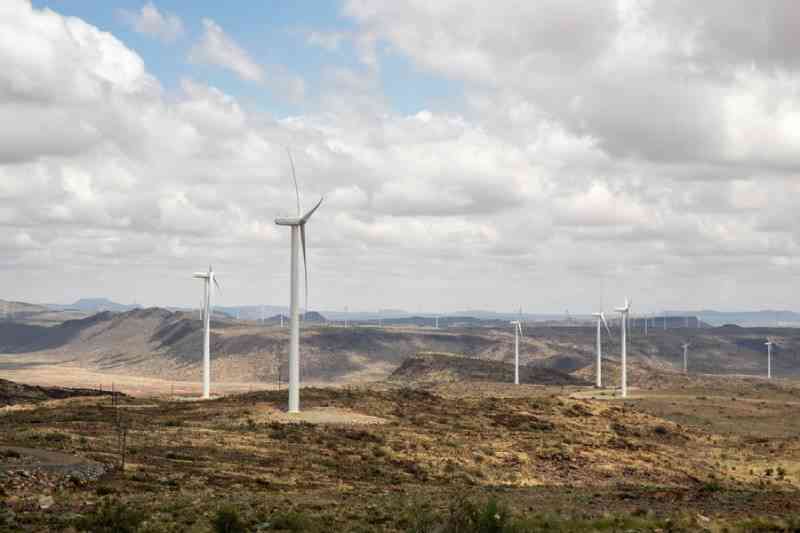
Audio By Vocalize

Many African participants walked into the UN climate conference held earlier this month in the Egyptian coastal city of Sharm El-Sheikh with much optimism but came out with unmet expectations.
The two-week gathering, also known as the 27th session of the Conference of the Parties (COP27) to the United Nations Framework Convention on Climate Change (UNFCCC), sought to move from negotiations to implementation and call for actions when extreme weather events are impacting the lives of millions of people worldwide.
Despite some progress at COP27, including a decision to set up a "loss and damage" fund and an agreement to establish a global adaptation framework, developed countries have been blamed for taking a passive attitude toward issues such as providing financial and technical support to the more vulnerable developing countries.

African participants disappointed
Africa accounts for 4 per cent of global greenhouse gas emissions, but suffers the most from them, noted African climate campaigners, adding that 20 per cent of the continent's population live in countries that are in the top 10 most vulnerable to climate change.
This year alone, the continent has seen deadly flooding in parts of West Africa and the worst drought in decades in the Horn of Africa.
Some 22 million people in the Horn of Africa are food insecure due to drought. Figures from the World Food Programme showed that at least 9.2 million livestock deaths occurred in the drought-affected areas of Ethiopia, Kenya and Somalia in 2022. In Nigeria, more than 600 people have been killed and over 3.2 million affected as a result of the flooding that hit more than 30 states in the country this year.
At the start of COP27, Chairperson of the African Union (AU) Commission Moussa Faki Mahamat called for climate justice to address the damage Africa has suffered due to climate change effects, appealing to the developed world to honour their promise made at COP26 to double funding by 2025.
However, as the conference closed on Nov. 20, African experts and civil society organizations found no good news for communities that are facing prolonged droughts, erratic rainfall and flooding.
Pan African Climate Justice Alliance (PACJA), a collection of civil society organizations, said COP27 ended leaving millions of Africans in continued climate-related misery.
Africans left COP27 disappointed, said PACJA Executive Director Mithika Mwenda.
"We came with the hope that the momentum created by the discussions in the year ahead of COP27 under the facilitation of UNFCCC, the COP Presidency, and the facilitation of friends of the COP will materialize with concrete outcomes in Egypt. But unfortunately, the end of COP is an anti-climax," he said.
While describing the "loss and damage" fund agreement as a "much-needed political signal to rebuild broken trust," UN Secretary-General Antonio Guterres said it is not enough to address concerns.
"A fund for loss and damage is essential, but it's not an answer if the climate crisis washes a small island state off the map, or turns an entire African country to desert," he said. 
Brazen double standard
Stay informed. Subscribe to our newsletter
Thirteen years ago in Copenhagen, developed countries promised to mobilize 100 billion U.S. dollars per year for climate actions in developing countries, but have so far defaulted with all kinds of excuses.
In 2021, nearly 200 participating countries adopted the Glasgow Climate Pact at the end of COP26, which includes an unprecedented goal for developed countries to double the funding provided to developing ones for adaptation by 2025. However, doubts were high that developed countries would again fail to honour their commitment.
This year at COP27, some rich nations attempted to cancel their long-delayed climate finance pledge, and although an agreement to establish a global adaptation framework was reached at the end of the conference, it lacked clarity and a credible roadmap to double adaptation funds.
And while developed countries are going back on their word and are returning to coal energy, especially amid a lingering energy crisis, some of them have been ordering developing countries to speed up the green energy transition.
In mid-September, the European Parliament passed an emergency resolution urging Uganda and Tanzania to halt the construction of a crude oil pipeline that passes on a 1,445-km journey from the oil wells in western Uganda to the Tanzanian seaport of Tanga, saying it threatens the "protected and sensitive" ecosystems.
The move was described as hypocrisy by Ugandan President Yoweri Museveni, who said later at COP27 that Europe is applying a "brazen double standard" towards Africa in its climate and energy policies.
"We will not accept one rule for them and another rule for us," Museveni wrote on his blog.
The African Development Bank's 2022 Africa Economic Outlook projected that Africa will need to mobilize as much as 1.6 trillion dollars between 2022 and 2030 to meet their Nationally Determined Contributions to fight climate change.
But as the developed world has failed to meet its financial commitment to the continent's green energy transition, a few experts in Africa, like Jonathan Tabalanga, an international relations expert and lecturer at Uganda's Cavendish University, fear that the continent may be left with no options but to continue using fossil fuels for development.
"Africa is confronted with a decision to make on whether to get their people out of poverty through industrialization, which is also a problem to the environment, or resort to eco-friendly means of production which are extremely expensive," Tabalanga said. 
Walking the talk
In late June, the AU published its Climate Change and Resilient Development Strategy and Action Plan (2022-2032) and described it as "a key instrument in supporting regional collaboration on climate change and more effective international partnerships."
"There is a need to improve the efficiency and effectiveness of transboundary cooperation to ensure that decision-making and investment occur at appropriate timeframes to respond to the speed of changes in the climate and environment," said the document.
While developed countries are turning a deaf ear to Africa's call for deeper cooperation on green development, many developing countries, including China, are reaching out to the continent with utmost sincerity.
At the 8th Ministerial Conference of the Forum on China-Africa Cooperation held last year, China proposed that the two sides advocate green and low-carbon development, and actively promote solar, wind and other sources of renewable energy, saying it will work closely with African countries to implement the green development program in the years to come.
China has walked the talk. For example, in De Aar, a town in the Northern Cape province of South Africa, Chinese company Longyuan Power has partnered with local firms on a wind power project that has been in operation since 2017 with an installed capacity of nearly 245 MW.
Chinese-built Adama wind farms, installed with 102 turbines with a total generating capacity of 153 MW, are helping Ethiopia tap into its rich renewable energy potential. In Kenya, official figures showed that the installed capacity of solar power is more than 100 MW, while the China-financed Garissa Solar accounts for 50 MW.
South African President Cyril Ramaphosa said recently that his country hopes to learn from China's experience in green development and energy transition, and is ready to actively participate in the Belt and Road cooperation.
At a time when the world is facing an energy crisis, China continues to make solid progress in dealing with climate change and plays an important role in advancing the global response to climate change, said UNFCCC Executive Secretary Simon Stiell when meeting with the Chinese delegation to COP27.
"China can be a very good contributor to the advanced levels of keeping Africa green because they are technologically more advanced. They can come and help us with solar, wind energy. Those areas are important," said Tabalanga, the Ugandan expert.
(Xinhua)